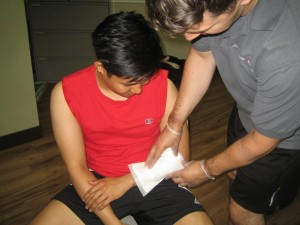
A snake bite is the occurrence of any given kind of a snake getting to bite the skin of a person. This is normally common with trekkers. In their quest to enjoy nature, trekkers are normally exposed to interacting with snakes in the wild and getting bitten. There are both poisonous and non poisonous snakes. Unless one is certain of the kind of snake that bit him, he should not take chances. Some snake bites are fatal therefore they will require immediate treatment.
The material posted on this page on on managing snake bite emergencies is for learning purposes only. If you suspect you, or anyone else, has been bitten by a snake consult your physician immediately. To learn to recognize and manage sudden medical emergencies such as poisoning enrol in first aid courses today.
When bitten by a snake, one needs not to panic. Panicking causes an increased heart beat that will also increase the pace of blood flow. This only increases the chances of the poison spreading in the body. One should also not panic because snake bites can be handled properly and the fatality successfully evaded.
It is important that a snake bite is treated with a lot of care and urgency. Due to their smaller body sizes, children are more prone to falling victims of the fatality of a snake bite. This is due to the fact that the venom gets to spread through the body faster than in an adult. A snake bite is treated with anti venom and this is the most effective way of saving a life from a snake bite. Therefore a victim needs to be rushed to an emergency room as fast as possible to get proper medication and avoid serious consequences.
Different Types of Poisonous Snakes
There are a number of poisonous snakes that can cause fatal snake bites. These include;
- Cobra
- Copperhead
- Coral snake
- Cottonmouth (water moccasin)
- Rattlesnake
For a snake to bite someone, it must have felt really threatened. However, in most cases, snakes will flee from confrontation. Also, most water snakes are not venomous, one should however be certain about the type of snake. Otherwise, all snake bites should be taken seriously.
Different snake bites can exhibit different kinds of symptoms. However, there are common symptoms that cut across all poisonous snake bites. Obviously due to the puncture from the bite, the first sign is the bleeding from the wound. The person may also experience blurred vision, dizziness, convulsion, fever, nausea, rapid heartbeat, burning and swelling of the skin around the bite as well as numbness and tingling sensation.
First Aid for a Snake Bite
A person with a snake bite should be kept calm with a lot of reassurance on the chances of treating the bite effectively. The bite point should be kept at a lower angle than the heart and the movement of the individual restricted too. There are suction pumps that can be used in such a situation. One should ensure that the manufacturer’s instructions are followed properly.
Any constricting clothing or jewelry should be removed so that swelling is reduced around the bite. When the bite swells fast and turns in color, then it is a poisonous bite. This should prompt one to check the vital signs of the bitten individual. If shock is detected, lay the person flat on the ground, raise the legs to a height of about a foot and cover him with a blanket.
Emergency medical help should be alerted immediately. Any information about the snake will be very important to the medics in their attempt to treat the bite. If the snake was killed, it should be shown to the professionals so that they can tell the kind of venom they are dealing with. If it happens that the snake slithered away, waste no time trying to find it.
